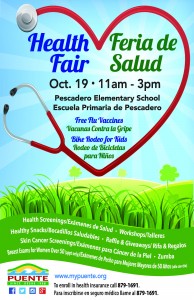Nineteen percent of South Coast residents don’t have health insurance. And overall, 40 percent of adults have not seen their primary care doctor in the past year, according to the results of a two-year community health survey conducted by Puente.
Puente staff and volunteers knocked on roughly 1,500 doors (and gates) to administer the survey, which does double duty as a population census and review of health care access in Pescadero, La Honda, San Gregorio, Loma Mar and their environs. The survey will point Puente toward a future in which its health care programs will succeed and expand to serve the custom needs of our local population.
The survey’s timing is not an accident. Generously supported by the Silicon Valley Community Foundation, the Lucille Packard Children’s Hospital, the Grove Foundation, and the Mills Peninsula Hospital Foundation, and supported by Stanford University’s Office of Community Health, the results are essential information for Puente in administering the region’s future mobile health clinic. Starting in 2015, the clinic will come fully staffed with bilingual nurses and doctors skilled in dealing with conditions ranging from diabetes to heart disease. Locals who may not have seen a physician in years will receive excellent care, as well as referrals if needed.
“The mobile clinic stands to make a huge difference, but we needed to make sure it works for everyone,” says Madeleine Kane, the Stanford University community health fellow who played a key role with moving the survey forward and putting together the report this summer. “Hopefully through this data we’ll be able to make a program that fits with what people actually need.”
And who are the populations most in need? According to Puente’s survey, Latinos, who make up 32 percent of the South Coast population, disproportionately lack any health insurance: 38 percent have no health care coverage whatsoever. The results were no less troubling for being predictable. “These data help us know where to look for community members who might still need a hand in navigating complicated systems, and ultimately see a doctor at least once a year for preventative checkups, rather than emergency room care,” says Kane.
Puente’s survey showed that even when people have some form of health care, be it private or government-backed programs like Medicaid, they are not taking advantage.
“Lots of people with health insurance aren’t using it, but we don’t know why,” says Kane. It could be the isolation factor – the nearest clinic is 25 miles away, and the nearest hospital is an hour’s drive. That’s a big problem when local populations are at risk for chronic diseases that require early intervention, like diabetes and high blood pressure.
The next step is figuring out Puente’s place in bridging those gaps. One of Puente’s core health programs is helping community members enroll in health care insurance programs, from Medi-Cal to ACE (Access to Care for Everyone in San Mateo) to new insurance programs under the Affordable Care Act (also known as Obamacare).
But no program is perfect. Kane said the survey elicited plenty of complaints about the Affordable Care Act. And while San Mateo County’s unique ACE program provides coverage for residents without legal status or residents who can claim exemption from the individual mandate from the Affordable Care Act, Puente’s survey revealed that only 50 percent of those covered by ACE had seen a doctor in the past year.
The survey laid bare some other discrepancies, like the fact that 73 percent of respondents with a college education had private health insurance, while that number dropped to 14 percent for anyone who never got to high school. To put it plainly, those with more education are more likely to see a doctor, than those who have less. The intersections between education, class and medical care continue to be troubling.
Puente confirmed that the La Honda population has a high concentration of retirees, in contrast with much of the area, and that many La Honda residents use Kaiser Permanente. Puente will use that information to plan for the medical services the mobile van provides in La Honda, to focus more on geriatric care and mobility limitations. Puente plans to encourage Kaiser to be a part of the medical solution on the South Coast.
But Puente isn’t waiting for the mobile van to conduct medical outreach to the residents who need it most urgently. This year we conducted an unprecedented immunization campaign geared toward farm workers, brought free dentistry into the fields, and won kudos for our efforts from Stanford University and San Mateo County. Puente will be holding the first-ever community health fair on October 19.

 A breast exam. An eye doctor. An STD test. These are all reasons someone on the South Coast might drive 25 miles to the nearest health clinic. Fortunately, anyone who comes to Puente’s inaugural community Health Fair on October 19 will have access to all those medical services – for free.
A breast exam. An eye doctor. An STD test. These are all reasons someone on the South Coast might drive 25 miles to the nearest health clinic. Fortunately, anyone who comes to Puente’s inaugural community Health Fair on October 19 will have access to all those medical services – for free.




